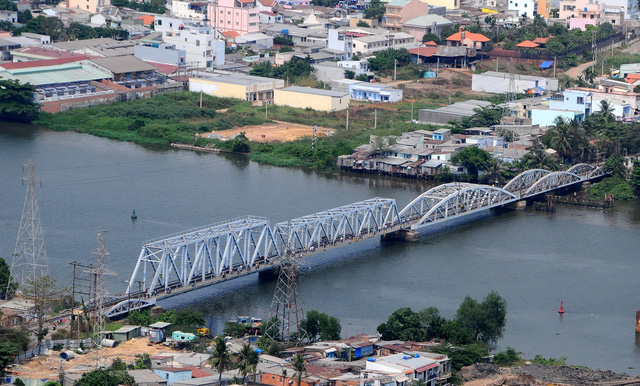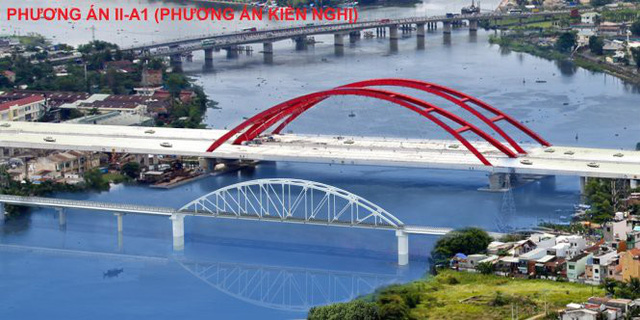Developer to charge toll for boats
traveling under railway bridge in Ho Chi Minh City
This
will be the first waterway toll imposed in the southern Vietnamese city

The existing Binh Loi
railway bridge in between Binh Thanh and Thu Duc Districts is seen from a
birdview. Photo: Tuoi Tre.
The rationale behind the first-ever
plan to charge a waterway toll for boats passing under a new railway bridge
in Ho Chi Minh City is raising eyebrows from locals who depend on the river
for daily life.
Local
residents are wondering why boats traveling underneath the Binh Loi Railway
Bridge will be expected to pay a toll, even though they will not be directly
using the currently under construction infrastructure.
Crossing
over the Saigon River, the new railway bridge, developed
by a joint venture between GUD and STD, links Binh Thanh and Thu Duc
districts.
The
structure is part of Pham Van Dong Boulevard, a primary transportation route
connecting industrial zones in the neighboring province of Binh Duong with
the inland container depot in Ho Chi Minh City.
A
representative of the developer announced that the ‘river toll’ will be
applied to boats passing under the facility once it is put into operation
during the first quarter of 2019.
The bridge,
which is being financed under a BOT (build-operate-transfer) scheme , broke
ground in late April 2015 as a part of an initiative to replace the
deteriorating 112-year-old currently used by trains on the railway.
In the BOT
framework, the developer receives a concession from the private or public
sector to finance, design, construct and operate a facility for a certain
period, during which it has to raise the finances for, and is entitled to
retain all revenues generated by, the project. The facility will be then
transferred to the public administration at the end of the concession
agreement.
The project
also includes upgrades to a 71-kilometer section of the Sai Gon River between
Binh Loi Bridge and the Ben Suc Wharf in Binh Duong.
Though many
agree the construction is much needed, the rationale behind the imposition of
a ‘river toll’ is raising serious concerns.
Asked to
comment on the controversy, Vu Duc Cuc, a representative of the GUD-STD joint
venture, confirmed that the waterway toll will only target boats with loads
weighing more than 300 metric tons.
“The new
Binh Loi railway bridge will prevent boats from being stuck during high tide
as the vertical clearance will be increased from 1.8 meters to 7 meters,” Duc
said.
‘Benefiting transportation’
Asked
whether trains using the bridge will be forced to pay a toll, Duc clarified
that only boats passing under the structure would be subject to the charge,
and no trains will be subject to the fee.
Duc
underlined that GUD-STD will not be collecting the toll directly, but will
instead contract the state agency charged with overseeing ports along the
Saigon River, from the Binh Loi railway bridge to the Ben Suc Wharf, in order
to “ensure transparency”.
Addressing
concerns that the toll will increase transportation costs and put further
pressure on local merchants, Duc replied that the waterway toll is still less
than the road toll trucks would pass to reach the same destination.
“Thus, the
price of goods will not be affected,” he said.
“I believe
putting the new Binh Loi railway bridge into operation will bring many
benefits to transportation and trading as the existing bridge obstructs
shipping between Ho Chi Minh City and Binh Duong,” the representative
concluded.
According to
plan, the new Binh Loi railway bridge will be opened during the first quarter
of 2019 while the upgraded section of the Sai Gon River between Binh Loi
Bridge and the Ben Suc Wharf will be completed sometime between April and
June.
Tuoi Tre News
|
Thứ Năm, 24 tháng 5, 2018
Đăng ký:
Đăng Nhận xét (Atom)

Không có nhận xét nào:
Đăng nhận xét